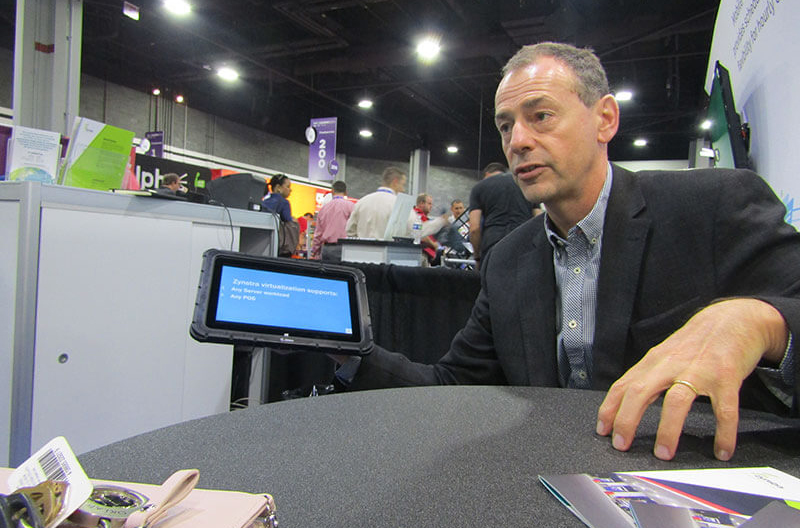Zynstra showcased its edge virtualization technology in October at the NACS Show in Atlanta. In the previous 18 months, the U.K.-based company has been receiving a significant amount of interest from grocery and convenience/fuel retailers, according to Gavin Bisdee, VP of global marketing.
Zynstra’s edge virtualization technology optimizes existing store technology and enables digital transformation.
“Some people may want completely frictionless consumer purchasing, but there are others who would prefer to be checked out by a store associate in the aisle,” Bisdee said. “At the moment, there are many grocery businesses and convenience/fuel retailers that don’t have the adaptability to offer multiple different customer experiences in that way. They might have a fixed register, but they don’t have a mobile kiosk or someone with a tablet in the aisle, mainly because it all comes back to the point-of-sale (POS) infrastructure. And that’s the barrier.”
Bisdee said when thinking of weighing scales or scanners and other peripherals that are tied into the POS infrastructure, you can’t just bring in another solution and expect seamless integration with the existing POS.
“What we’ve created is patented virtualization technology. Basically, we’re decoupling the hardware from the software,” he said.
Zynstra can virtualize the software that runs on a fixed point-of-sale register and store it on a server that resides locally inside the store. The POS software, along with all the peripherals and any other applications, is run off the server. Also, software for a number of other applications such as the store manager’s back office work stations or kitchen management systems can be virtualized so everything is run off the same system.
“It’s like you’re stripping down a lot of those devices and hardware assets and virtualizing that all into one server, and then we manage that from the cloud,” Bisdee said. “So, in terms of the retail verticals that we are playing in, you can see that suddenly becomes incredibly attractive to retailers.”
Bisdee also said Zynstra can provide the solution for older POS systems that will need to update to Windows 10 in October 2021. Retailers are faced with replacing the hardware, at millions of dollars in cost; or using Zynstra’s virtualization solution, he said.
Zynstra can virtualize the existing POS system and run it on the server, which is updated 24/7 and will have the latest Windows software. With this choice, retailers don’t have to replace their old hardware but can virtualize their systems through Zynstra’s server.
Zynstra’s technology also will allow a retailer’s employees to check out customers using mobile tablets or kiosks, thereby elevating the customer experience, Bisdee said. He also added that Zynstra’s solution is PCI compliant, which also can reduce costs.
In the last 18 months, Bisdee said Zynstra has worked with Pilot Flying J, Wawa and Circle K stores. One customer said it was 50 percent faster to roll out a new store with Zynstra’s technology than it previously was, according to Bisdee.
“The gain in revenue and speed to market from someone saying, ‘it’s going to take us six months to integrate 100 new stores, but with these guys it’s going to take us three months’—is significant,” Bisdee said.
He said results from a study talking to senior executives and IT leaders of several c-store and grocery retailers showed that only 18 percent said they have the right POS infrastructure for the future.
“They know they’ve got to do something, but they don’t want to spend a fortune, either. I thought that was really revealing,” he said. “We’re really buying them time.”
Another issue of concern the study revealed was retailers having to roll out IT teams to fix problems in the stores. With Zynstra, each store has a small server running all its applications and because it’s got automated software patches and updates it is constantly being monitored, Bisdee said.
“It means that you can almost eradicate issues that might apply to one of your lanes before it happens, because you can obviously see a warning on your system and then you can remotely deal with it rather than having to send IT teams out,” he said.
Edge virtualization technology also allows Zynstra to take multiple devices and virtualize the software on each, then put them all on one device.
Zynstra offers full support and maintenance for its software. Customers provide their own hardware.
“Make no bones about it, every leading technology analyst now says the future is at the edge, which basically means it’s the technology running outside the data center—in the store,” Bisdee said. “We’re almost going 360…What we’ve created is basically edge virtualization, so it’s very, very different. It’s designed for a hostile environment because retail’s a hostile environment; a data center can’t deal with that. Virtualization in the store can deal with that.”
Where does the store experience go if everything is going to be completely frictionless? Bisdee said he thinks most retailers are looking at the bigger picture. They want to provide a seamless, omnichannel, frictionless journey, and they want their store associates repurposed for other work within the store to build their brand, build engagement and to be able to advise people so that customers will walk out feeling that they had a good experience. It’s about putting the right technology into the hands of store associates to enable them to improve customer experiences.
“I think that’s where the future will be,” Bisdee said. “I think it’s just getting that right integration.”

